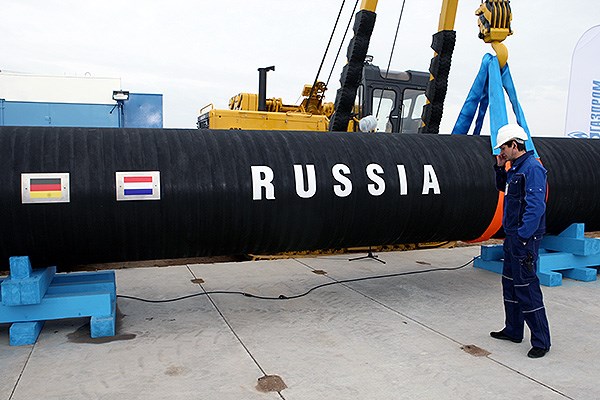Kyiv is looking for ways to ‘bury’ Nord Stream-2 pipeline
Ukraine is in talks with the United States aimed at preventing Russia from finishing the Nord Stream-2 gas pipeline, said the head of the Ukrainian national oil company, Naftogaz, Andriy Kobolyev.
He believes that "the game is not over yet." "The Russians will try to create their own technical capabilities to complete the pipeline ... We are now discussing how to be sure that this project is buried completely," the top manager said, as quoted by RIA Novosti.
At the same time, Kobolyev made it clear that Washington's sanctions policy on Nord Stream-2 was "one of the most important steps" in support of Ukraine's energy security.
Meanwhile, Gazprom's pipe-laying Akademik Chersky, which, according to the head of the Russian Energy Ministry Alexander Novak, can complete the Nord Stream-2 gas pipeline, continues to move west and is heading to the Egyptian port of Suez. According to the monitoring service VesselFinder, the ship is due to arrive there on March 25.
On February 18, 2020, Russian Deputy Energy Minister Pavel Sorokin assured that the forecasts for the completion of the Nord Stream-2 gas pipeline didn’t change. As the deputy head of the Russian Ministry of Energy said at a press conference in Berlin, "the project should be completed by the end of this year - the beginning of the next one, this is the most extreme."
On February 11, it became known that Gazprom hopes to launch the Nord Stream-2 gas pipeline by the end of this year. The presentation prepared for the company's investor day said: "Launch: end of 2020."
Earlier, in late January, deputy chairman of Nord Stream 2 AG, Elena Burmistrova, indicated that the construction of Nord Stream-2 would be completed solely by Russia.
US Congress approved the National Defense Authorization Act on December 17. President Donald Trump signed it on December 21. Following the adoption of the budget by Congress, two Republican US senators, Ted Cruz and Ron Johnson, sent a letter to Allseas, demanding that the company stop all work on the pipeline. "…the consequences of your company continuing to do work -for even a single day after the President signs the sanctions legislation-would expose your company to crushing and potentially fatal legal and economic sanctions," the letter reads.
Allseas company has been working with Gazprom and Nord Stream 2 AG for several years. In 2016, it won tenders for laying pipes for Nord Stream 2 and TurkStream gas pipeline projects.
The sanctions stipulated in the NDAA can apply to companies which provide vessels for the construction of export pipelines. In the case of Russia’s Gazprom, the providers are Swiss Allseas and Saipem, which own the world’s fastest pipe-laying vessels, which can lay up to 5 km per day.
According to the amendments to the NDAA authored by Republican Senator Ted Cruz and Democrat Jeanne Shaheen, such restrictions will safeguard Europe’s energy security.
The initial version included severe sanctions on Russian government debt, with restrictions on the secondary market and ruble-denominated bonds, of which $44 billion is held by non-residents of Russia.
The bill gives the US Department of State 60 days to compile a list of companies that will come under the sanctions. The companies will then be given another 30 days to cease their activity.
The US could have imposed sanctions on the participant companies even earlier: They were set out in the Countering America’s Adversaries Through Sanctions Act (CAATSA), which was passed in 2017, notes Gerhard Mangott, professor of political at the University of Innsbruck, an expert on Eastern Europe.
However, the Trump Administration chose not to do so, even though Germany’s position in the dispute with the US was inherently weak: “If Germany had tried to get revenge by punishing the Americans for the sanctions on Nord Stream 2, it would have found itself in a very vulnerable position with regard to restrictions against the German automotive industry,” said Mangott.
